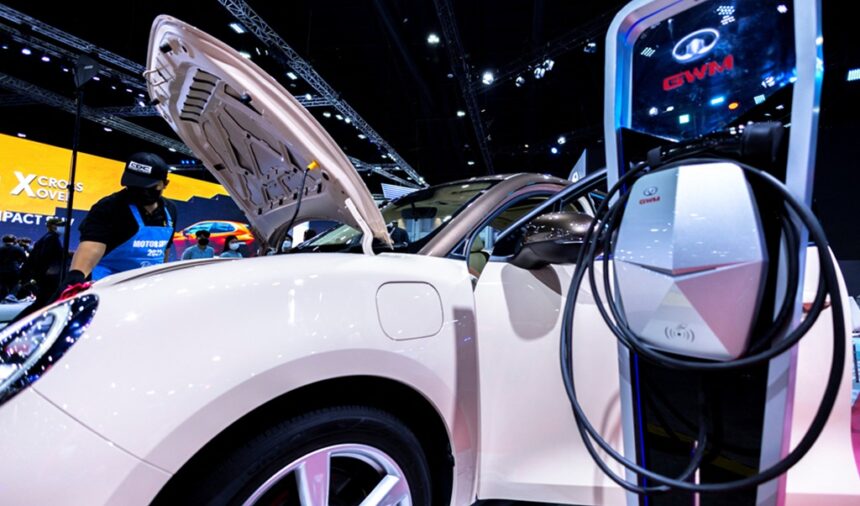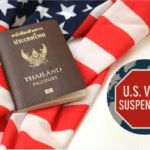BANGKOK – Thailand’s car insurance industry is on edge as rumours spread about a possible bankruptcy of a Chinese electric vehicle (EV) maker operating in the country. This has triggered fears that EV insurance may already be generating losses.
Insurance leaders say the news highlights growing worries for local insurers, especially when it comes to repair claims for vehicles with hard-to-find spare parts. A recent report claimed that Neta Auto Thailand’s Chinese parent company is being investigated over its ability to repay debts.
Many Thai car insurance companies have already raised their EV insurance premiums to reflect these added risks. For example, annual premiums that once cost about 20,000 baht now stand between 25,000 and 28,000 baht, particularly for brands with weak service networks and unreliable supply chains.
Insurers continue to accept new EV policies for the struggling brand, but say renewals come with much higher premiums. This price jump is due to risks like the shortage of spare parts and uncertainty over the car maker’s financial health.
A few insurers have stopped offering cover for some EV brands or models. They point to issues such as technical challenges, a lack of trained repair staff, and the high cost of fixing cars at brand-approved centres.
Frequent price reductions by Chinese EV brands create another problem for insurers. Sudden drops mean the insured value of a car can end up higher than its current selling price.
EV Car Insurance Losses
Apisit Anantanatarat, CEO of Bangkok Insurance (BKI), told the Bangkok Post the company is cautious with EV insurance because of high loss ratios. In 2024, BKI reported an average claims ratio of 67-68% for EV policies, with some brands close to 100%.
While this is better than two years ago, when the ratio was over 120%, Mr Apisit said EVs still carry a higher risk. BKI’s EV insurance policies are 15-20% more expensive than the industry average in response to these risks.
To limit costs, BKI is planning to set up its own EV repair shops with Chinese partners. This will help the company rely less on expensive, brand-run repair services.
Mr Apisit added that sharp price cuts by Chinese EV brands moving stock to Southeast Asia to avoid US tariffs have led to insured values being higher than new retail prices. This, he says, could tempt some policyholders to damage or abandon their cars to claim a total loss.
Some EVs, especially budget models, are hard to sell second-hand, which could encourage this behaviour.
Amorn Thongthew, managing director of Viriyah Insurance, said their EV insurance business lost money last year. The company covers 66,000 EVs across more than 10 brands, with total premiums of 1.5 billion baht.
He said repair and parts costs for EVs are about 50% higher than for regular vehicles, yet their EV premiums are only 15% higher. This gap doesn’t cover the risk.
Viriyah plans to raise EV premiums in 2025 and is in talks with EV distributors to lower parts prices and improve claims processes. The company will launch an “EV 2+” policy this quarter, which includes cover for repairs at brand-approved centres.
Guillaume Mirabaud, CEO of AXA Insurance Thailand, said AXA has seen small losses in its EV insurance business. The company uses data to set prices and avoid undercutting rivals. AXA’s China office is working with car makers to build better risk management.
He said, “We are committed to EV insurance but won’t join in price wars. Each policy should match the risk of the specific model.”
EV Manufacturers Face a Bumpy Road
From January to April, sales of battery EVs in Thailand jumped 46% to 33,633 cars, while sales of petrol and diesel cars dropped 13% to 48,784, according to the Federation of Thai Industries (FTI).
Plug-in hybrid sales soared 409% to 3,543 units, while regular hybrid sales fell 11% but remained the most popular EV type with a 20% market share, just behind combustion-engine cars at 24% for the first four months of 2025.
Despite strong EV sales, concerns are rising about fierce competition among manufacturers and the wider slump in the Thai car industry.
The EV price war is heating up, especially with big players like BYD looking to boost sales. Hozon Auto, which owns Neta Auto Thailand, is struggling with its finances, while Great Wall Motor (GWM) is shifting towards more diesel vehicles.
People looking to buy EVs are also put off by high maintenance and replacement battery costs. Other challenges include higher insurance premiums for EVs and stricter lending criteria from banks due to weaker buying power.
EV makers are expected to face intense price competition as long as the economy stays weak, according to Kriengkrai Thiennukul, chairman of the FTI and a member of the National EV Policy Committee.
He said the tough economy has made buyers more careful, so some Chinese brands have slashed prices to boost sales. Chinese car makers have seen falling EV sales not just in Thailand but in other countries too, leading to even steeper discounts.
After BYD cut prices for 22 of its models, including the Seagull EV, which now sells for less than some motorbikes, other Chinese brands followed with their deals. Non-Chinese brands also introduced discounts to protect their market share.
Kriengkrai said only the strongest companies will remain in the EV sector. Chinese brands want to grow sales and help China become the top EV exporter worldwide.
Chinese EV Price Wars
In Thailand, the local price war is likely to continue through this year, but might slow if the market stays sluggish and loans remain hard to get, according to Narong Sritalayon, chief executive of Thonburi Neustern Co., a Geely EV distributor.
Banks and lenders are tightening approvals to avoid bad loans, as household debt in Thailand remains high. The country’s household debt-to-GDP ratio was 88.4% last year, down from a peak of 95.5% in 2021, but still high compared to neighbours.
Thailand’s Joint Standing Committee on Commerce, Industry and Banking expects GDP growth below 1% for the second half of this year, with 2025 growth estimated at 1.5-2%.
Sun Baolong, head of Southeast Asia business at Hozon Auto, thinks the EV price war in Thailand could end next year. He believes car makers involved should consider how price cuts affect their brand image and customer confidence. He added that a price war can make buyers hesitant to purchase, waiting for even lower prices.
Kriengkrai feels the competition will not damage trust, saying buyers will learn which brands suit them and focus more on technology. EV makers are adapting by changing their production lines or reorganizing their management teams to better meet customer needs.
Shifting to Diesel Cars
GWM (Thailand) has shifted focus to diesel cars, even after investing billions of baht in EV production. The company earlier announced a 23 billion baht investment for battery EV and battery cell production, and has already spent 12 billion baht, with the rest planned over three years, said Parker Shi, president of GWM International.
Wayne Zhou, managing director of GWM (Thailand), said GWM isn’t moving away from EVs but is expanding its range to match Thai consumer preferences. GWM now offers hybrids, plug-in hybrids, and battery EVs, and recently launched the GWM Tank 300 Diesel, which has been well received by Thai buyers.
Mr Zhou said the Thai car market is split about half and half between combustion-engine vehicles and new energy vehicles, which is why GWM added diesel models. He stressed that the company is still committed to EVs.
Even the Thai government, which strongly supports battery EV production, has not left out combustion technology, adjusting tax incentives for plug-in hybrids with longer electric range.
In April, the Cabinet approved a lower excise tax for these hybrids as part of efforts to encourage more investment while the industry shifts from combustion to new energy vehicles, said Deputy Finance Minister Paopoom Rojanasakul.
Meanwhile, Hozon Auto is restructuring management and working with trade partners to convert debt into shares and raise new funds to fix its financial situation, according to Neta Auto Thailand.
Bankruptcy Claims Denies
A new board for Neta Auto Thailand, with representatives from China, is set to be created by 12 June. Neta Auto Thailand has denied reports that its parent company faces bankruptcy, stating the firm is only facing a court review of its debt repayment ability.
Guillaume Mirabaud, CEO of AXA Insurance Thailand, said Neta’s financial issues call into question the business model of some Chinese EV brands, which could influence future buying decisions for both EVs and related insurance.
He highlighted the impact on customers, noting that Neta owners may struggle to get repairs done due to a lack of spare parts, though the company opened a new parts centre in Nakhon Pathom in May to help with after-sales service.
Mr Mirabaud said regulators should seek stronger guarantees from Chinese EV companies to ensure stable service and customer support, given the subsidies they’ve received. He advised buyers to look beyond prices and consider the financial stability of their insurers, as stronger companies can absorb these risks rather than pass them on to customers.
Lars Heibutzki, CEO of Allianz Ayudhya General Insurance, said the situation may affect the whole car industry by hurting resale values for certain EV models.
While Neta Auto Thailand denied bankruptcy and opened a new parts centre, Mr Heibutzki said he understands why policyholders are worried. If the parent company’s finances get worse, delays in sourcing parts could increase repair costs and insurance premiums or lead to tighter coverage for Neta owners. Some insurers may even stop covering brands where long-term support is uncertain.
Guillaume Mirabaud added that 2024 was a tough year for motor insurance, with new car registrations dropping by over 20% in a weak economy. He expected a rebound later in the year, driven by climbing EV sales as brands compete on price.
He explained that most insurers are losing money on EV insurance because high parts costs, especially batteries, push up claims. He called for updated pricing and more tailored EV insurance for customers, saying AXA has pushed for this approach.
Other insurance leaders agreed that if a troubled automaker leaves the market, insurers will need to find their sources for parts and set up approved repair networks to handle claims. An exit could also raise costs for policyholders, especially if repair waits get longer.














